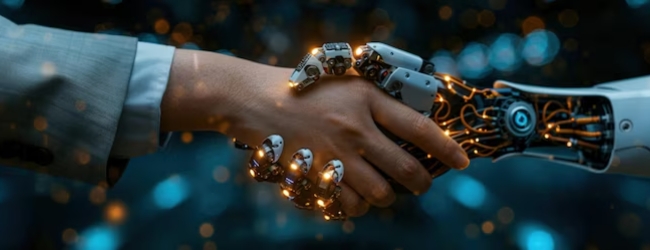Table of contents
Artificial Intelligence (AI) has come a long way from beating humans in chess to writing poetry, driving cars, and diagnosing diseases. But one question still dominates public debate:
Can AI replace human intelligence?

Let’s break this down with facts, real-life Indian business examples, expert opinions, and future predictions while busting some common myths.
What is Human Intelligence vs. Artificial Intelligence?
| Feature | Human Intelligence | Artificial Intelligence |
| Learning Type | Adaptive, intuitive, emotional | Based on data and algorithms |
| Creativity | Original thinking, abstract reasoning | Pattern recognition, data imitation |
| Emotions | Yes | No (simulated only) |
| Consciousness | Self-aware | Not conscious |
| Decision-Making | Ethical, emotional, logical | Statistical and logical |
Can AI Replace Human Intelligence? ( Truths & Myths )
In this article, we break down the truths and myths surrounding this hot topic, helping you understand what AI can and can’t do. Let’s explore how close machines are to matching the human mind, and what that means for our future.
Truths
AI is faster at specific tasks: AI can process data and make decisions faster than humans in areas like:
- Fraud detection in banks (e.g., HDFC Bank uses AI for anomaly detection)
- Medical diagnostics (e.g., Niramai uses AI for early breast cancer screening in India)
- Language translation (e.g., Google Translate)
AI can outperform humans in routine & repetitive tasks: In sectors like manufacturing, data entry, and logistics, AI enhances efficiency, reduces errors, and saves time.
AI can help in decision-making: Tools like chatbots, CRMs, and analytics platforms use AI to assist businesses (e.g., Flipkart uses AI for product recommendations and logistics optimisation).
Myths
AI will completely replace humans.
- Truth: AI lacks emotional depth, consciousness, and moral understanding. It supports human decision-making but cannot completely replace human judgment.
AI can think like humans
- Truth: AI follows programmed logic. It doesn’t think—it calculates.
All jobs will be taken by AI
- Truth: According to WEF’s Future of Jobs Report 2023
“AI will displace 85 million jobs by 2025, but also create 97 million new roles.
Real-World Examples from India
- Reliance Jio: Uses AI for network management, improving customer experience and reducing downtime.
- Zomato: Implements AI for delivery time prediction, route optimisation, and fraud detection.
- Tata Motors: Uses AI for predictive maintenance and to enhance manufacturing efficiency.
- BYJU’S: Integrates AI in its ed-tech platform for personalised learning experiences.
Where AI Falls Short
- Lack of empathy and emotional intelligence
- Inability to make moral or ethical decisions
- Creativity is limited to existing data
- Dependency on training data and human inputs
- Susceptibility to bias in algorithms
ALSO READ – AI vs Your Job: Boss Wallah’s 2025 Survey Uncovers Shocking Workforce Panic
Future of AI and Human Collaboration

The most likely scenario is collaboration, not replacement.
Future Trends:
- AI will assist, not replace: AI will handle data-heavy tasks while humans focus on creativity, empathy, and leadership.
- Rise of hybrid jobs: Roles like “AI ethicist,” “human-AI interaction designer,” and “AI trainer” will increase.
- AI in Indian government services: AI is being explored in agriculture, traffic management, and even law enforcement (e.g., Delhi Police’s facial recognition tech).
ALSO READ – AI for Entrepreneurs: How to Leverage Artificial Intelligence to Scale Your Startup in 2025
Key Takeaways
- AI is powerful, but not a full replacement for human intelligence.
- Human traits like emotional intelligence, ethics, and creativity are still irreplaceable.
- AI will augment human abilities, not eliminate them.
- Several Indian companies are already using AI to improve operations.
The future will be human-AI collaboration, not competition.
Learn more about social media skills here to unlock new growth opportunities
Need Expert Guidance?
Starting a business can be challenging, but you don’t have to do it alone! At Boss Wallah, our 2,000+ business experts are ready to provide valuable insights and guidance. Whether you need help with marketing, finance, sourcing, or any other area of your business, our business experts are here to help you succeed
Confused about Which Business to Start?
Want to start your own business but unsure which one to choose? Explore Boss Wallah, where you’ll find 500+ courses by successful business owners, featuring practical, step-by-step guides on starting and growing various businesses. Find your perfect business idea today
Conclusion
So, can AI replace human intelligence?
Not entirely. While AI is transforming industries and performing tasks with high efficiency, it lacks the soul, ethics, and emotional intelligence that define human cognition. The future isn’t about machines taking over, but about humans and AI working together to build a smarter, more efficient world.
Explore more blogs to learn more about Digital skills
Frequently Asked Questions (FAQs)
1 . Can AI replace human intelligence completely?
- No, AI can’t replicate emotions, ethics, or conscious decision-making.
2 . What tasks is AI better at than humans?
- Data processing, pattern recognition, automation, and repetitive tasks.
3 . Will AI take away all jobs?
- No. It will replace some roles but also create new ones.
4 . What are the limitations of AI?
- Lack of creativity, emotional understanding, moral reasoning, and bias in data.
5 . Is AI smarter than humans?
- In specific tasks—yes. Overall intelligence—no.
6 . Can AI become self-aware in the future?
- Currently, no. Consciousness remains unique to humans.
7 . How is India using AI?
- In sectors like healthcare, education, fintech, logistics, and agriculture.
8 . Can AI be dangerous?
- It can be, if misused or biased. Hence, ethics and regulation are vital.
9 . Which companies in India use AI?
- Flipkart, Zomato, HDFC, Tata, BYJU’S, and Reliance, among others.
10 . How can one prepare for an AI-driven future?
- Learn tech skills, focus on emotional intelligence, and adapt to hybrid roles.


